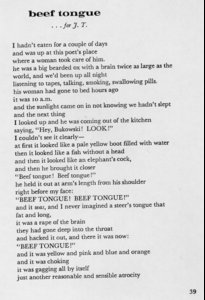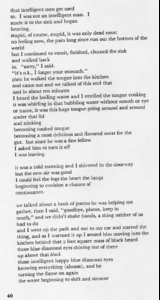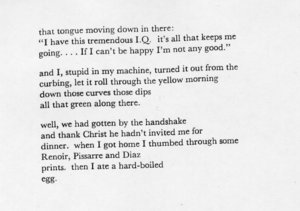LickTheStar
Sad Flower in the Sand
Just received my HB of Portions and I did notice that there's nothing to indicate "First Edition" or "limited to 1000 copies" but... I'll keep the whining to a minimum! ;)
I did notice that there's nothing to indicate "First Edition" or "limited to 1000 copies" but... I'll keep the whining to a minimum! ;)
The book is a regular trade publication with an initial printing of 1,000 hardcover copies.
Hence, no limitation/colophon notation.
Well, you are referring to Women, of course, and we have noted a lot of the changes in other threads here. But if there is "more to the story" than we know, I am going to have to twist your arm to come out with it!On one occasion Buk did not like the editorial changes John Martin made in one of his books, so JM changed the text back to what Buk had originally written for the next printing. There is more to the story...
If it's criticism of Martin, you're too late. ;)I'm not mentally healthy enough for gossip and criticism, so i should have left out the "more to the story" reference. :D
Here's one: Compare the three versions of the crunch. Tell me if you honestly believe that Bukowski is responsible for all of the language in the last one....I've never read a single complaint about Martin changing his poems...
Has anyone ever known someone who won a pissing contest? :D
mjp said:Here's one: Compare the three versions of the crunch. Tell me if you honestly believe that Bukowski is responsible for all of the language in the last one.
Yeah, me.Has anyone ever known someone who won a pissing contest?
Sure.I'm not sure, it could be B. having fun...
I love opinions they are such wonderful things, and the most wonderful thing of all about opinions is they require no knowledge whatsoever. They are merely someones opinion. ;)
If I didn't know any better I would say you were dismissing my opinion as cute but irrelevant.Well, what can I say? If you think Martin is responsible for the changes in poetry as well, that's certainly up to you.
I did and I do....thanks for the nice words re. my research. I know you're not usually publicly lavish with your praise, so I guess you really meant that.
The changes between the Second Coming version and the Love is a Dog From Hell version are completely believable and reasonable Bukowski changes. But then, after he has been conveniently dead for five years, we get the crunch (2). But the crunch (2) has some problems that can only be explained by the assumption of tampering (or I suppose they could be seen as proof of it, if you were so inclined).the underlying assumption is that Bukowski couldn't have written such a bad line and that it had to be someone else's doing.
I agree with that completely. A bibliography should be factual, and where facts are not present, assumptions should not be made.I've learnt quite a few things while doing my research on Bukowski, but I think that the most important ones (bibliographically speaking) are NOT to extrapolate things and NOT to take anything for granted. Anyfuckingthing. Believe me.
But even if we assume that Martin never altered any of the poetry, which I am willing to do from here on out, what are we left to believe? That Bukowski rewrote the crunch, which he had already "polished" for Love is a Dog From Hell?
That's certainly not my view.Anyway, even if we view Martin as an objective, transparent vessel through which Bukowski's work flowed...
In that case, they should read Uncle Howard's book.But people don't want that Bukowski. They want the Bukowski of legend and assumption.



